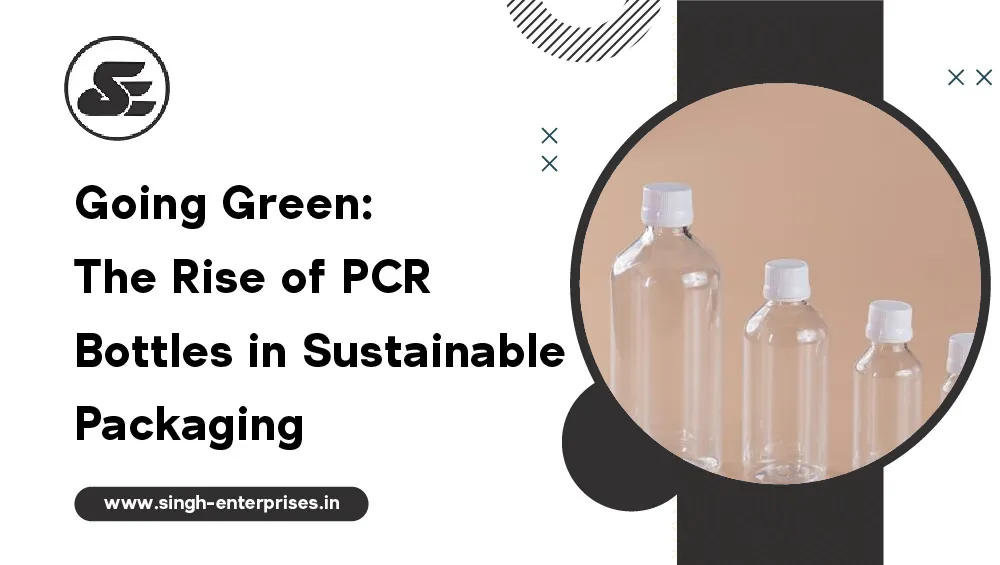In recent years, the packaging industry has witnessed a significant shift towards more sustainable practices, particularly in the realm of plastic packaging. As the world becomes increasingly aware of the environmental impact of single-use plastics, manufacturers are actively seeking alternatives that are both functional and eco-friendly. One such solution that has gained traction is the use of PCR (Post-Consumer Recycled) bottles in sustainable packaging. In this blog, we will delve into the changing landscape of plastic packaging, explore the benefits of PCR bottles, and highlight their role in promoting a greener future.
Evolution of Plastics in the Packaging Industry
Plastics have long been the go-to material for packaging due to their versatility, durability, and cost-effectiveness. However, the negative impact of single-use plastics on the environment has prompted a paradigm shift in the industry. Manufacturers are now exploring innovative ways to reduce their carbon footprint and adopt more sustainable practices.
In recent years, there has been a growing concern about the environmental impact of plastics, particularly single-use plastics, in the packaging industry. The convenience and affordability of plastics have made them widely used, but their long-lasting nature and improper disposal have led to significant pollution and harm to ecosystems.
As a response to these concerns, the packaging industry has started to witness an evolution in the use of plastics. Manufacturers are now focusing on finding more sustainable alternatives to traditional plastics, such as biodegradable and compostable materials. These materials have the ability to break down naturally over time, reducing their impact on the environment.
Additionally, there has been a shift towards using recycled plastics in packaging. By incorporating recycled materials into the production process, manufacturers can reduce the demand for new plastic and promote a circular economy. This not only helps to minimize waste but also conserves valuable resources.
The Advantages of PCR Bottles
PCR bottles are a significant step towards sustainable packaging solutions. These bottles are made from post-consumer recycled plastic, which means they are sourced from materials that have already been used and discarded by consumers. By diverting plastic waste from landfills and incorporating it into the production of new bottles, PCR technology significantly reduces the demand for virgin plastic and minimizes the overall environmental impact.
In addition to the environmental benefits, PCR bottles offer several other advantages that make them a preferred choice for packaging solutions. One of the key advantages is their versatility. PCR bottles can be used for a wide range of products, including personal care items, household cleaners, food and beverages, and pharmaceuticals. This versatility makes them a practical option for various industries.
Despite being made from recycled materials, PCR bottles are designed to be just as strong and sturdy as bottles made from virgin plastic. This ensures that the products stored in these bottles are well-protected and not prone to leakage or breakage.
Furthermore, PCR bottles are cost-effective. The use of recycled materials in their production helps to lower manufacturing costs, making them a more affordable option compared to bottles made from virgin plastic. This cost-effectiveness can benefit both manufacturers and consumers, as it allows for competitive pricing and potentially lower product costs.
By utilizing post-consumer recycled plastic, these bottles promote the concept of a closed-loop system, where materials are continuously reused and recycled. This reduces the reliance on finite resources and fosters a more sustainable approach to packaging.
The Sustainability of PCR Bottles
One of the key benefits of PCR bottles is their environmental sustainability. By utilizing recycled materials, these bottles help conserve natural resources, reduce energy consumption, and lower greenhouse gas emissions associated with the production of virgin plastic. Additionally, PCR bottles contribute to waste reduction by giving new life to post-consumer plastics that would otherwise end up in landfills or pollute our ecosystems.
The Role of HDPE Plastic
HDPE (High-Density Polyethylene) plastic, in particular, has emerged as a popular choice for PCR bottles due to its excellent properties. HDPE is known for its durability, chemical resistance, and versatility, making it ideal for a wide range of packaging applications. Additionally, HDPE plastic is highly recyclable, allowing PCR bottles made from HDPE to be easily incorporated into the recycling stream.
Commitment to Sustainability at Singh Enterprises
At Singh Enterprises, we recognize the importance of sustainable packaging and are committed to offering eco-friendly solutions to our clients. Our PCR bottles, made from high-quality HDPE plastic, provide the perfect balance of functionality and environmental responsibility. By choosing PCR bottles from Singh Enterprises, businesses can demonstrate their commitment to sustainability while delivering products that meet the highest standards of quality and durability.
In conclusion, the rise of PCR bottles in sustainable packaging represents a significant step towards a greener future. As the packaging industry evolves, manufacturers like Singh Enterprises are embracing eco-friendly solutions that minimize waste, conserve resources, and reduce environmental impact. By opting for PCR bottles made from HDPE plastic, businesses can play an active role in promoting sustainability while meeting their packaging needs. Together, we can pave the way for a more environmentally conscious and responsible approach to packaging.





